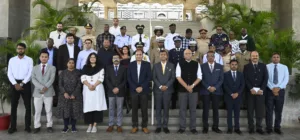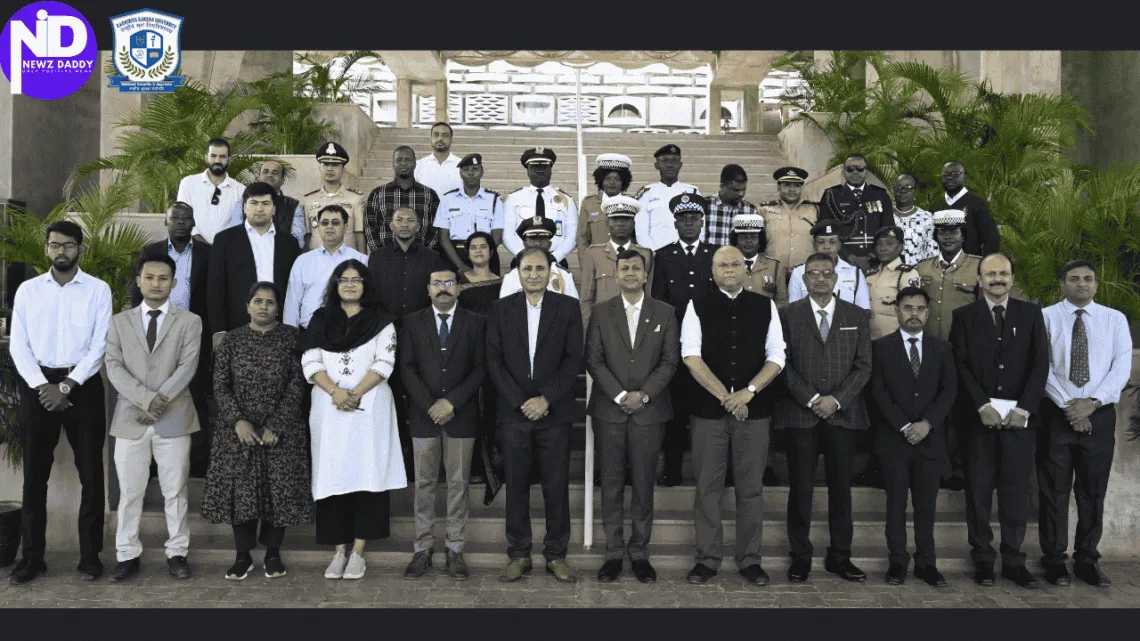Inside The Training On Road Safety And Traffic Enforcement At RRU
Newz Daddy Educational Updates
Rashtriya Raksha University (RRU), an Institution of National Importance under the Ministry of Home Affairs, Government of India, inaugurated an international training programme on “Road Safety and Traffic Enforcement” under the aegis of the Indian Technical and Economic Cooperation (ITEC)
Programme of the Ministry of External Affairs (MEA), Government of India. The two-week programme, being held from 10th to 21st November 2025, brings together 27 officers from 18 different countries. The initiative aims to promote international collaboration, share India’s expertise in traffic management, and enhance global capacity in road safety enforcement and policy development.

The ITEC programme has long been India’s vehicle for training and capacity-building of professionals from developing nations. Bringing 27 officers from 18 countries underlines the global reach of the training and the emphasis on cross-cultural exchange. “Road safety and traffic enforcement” as a focus links with Sustainable Development Goal (SDG) targets on safe mobility and reducing road traffic deaths globally. India’s expertise in traffic management is increasingly recognised through model programmes and overseas training offerings.
The programme is being organised by the Centre of Traffic Management, functioning under the School of Internal Security and SMART Policing (SISSP), in collaboration with the International Cooperation and Relations Branch and the Directorate of Professional Development and Training of RRU. This collaboration reflects the University’s continued efforts to bridge research, policy, and practice in the domain of safety and security through both domestic and international partnerships.
The Centre for Traffic Management and Road Safety (CTMRS) at RRU is explicitly tasked with research, training and policy advocacy in road safety and mobility. The School of Internal Security and SMART Policing (SISSP) emphasises modern, data-driven, responsive policing and safety research. Such institutional setups illustrate how RRU is positioning itself not just as a teaching university, but as a global hub for internal security education with traffic and mobility as part of broader safety frameworks. Collaboration between branches (research, training, international cooperation) strengthens the practical value of the programme for participants.
The inaugural session was graced by Dr Dharmeshkumar Prajapati, Registrar of RRU, who, in his address, emphasised that road safety is not merely a matter of regulation, but a global responsibility that connects human security, governance, and sustainable development. He highlighted India’s steady progress in adopting technology-driven enforcement, data-based road safety strategies, and community-oriented awareness campaigns, aligning with the broader national vision of innovative and safe mobility. Dr Prajapati also drew attention to India’s active commitment to the United Nations Decade of Action for Road Safety (2021–2030) and its relevance to achieving the Sustainable Development Goals (SDGs). He reaffirmed RRU’s role as a leading centre for internal security education, capacity-building, and research, contributing to global safety and security through academic exchange and institutional partnerships. The connection between road safety and human security is increasingly emphasised: safe roads support livelihoods, health, governance and community well-being.
India’s “Decade of Action for Road Safety (2021–2030)” is part of a global UN initiative to halve road deaths and injuries. The mention of technology-driven enforcement (for example, speed-cameras, ANPR, integrated command centres) aligns with India’s recent push to use smart infrastructure in traffic management. RRU’s capacity-building framing means that participants are likely to gain not only skills but also institutional networks and research exposure.
Over the course of the two-week programme, participants will engage in expert-led sessions, interactive discussions, and field visits focusing on innovative road safety management, enforcement mechanisms, and community engagement models. Delegates will visit key traffic management facilities, including the Gujarat Road Safety Authority, Integrated Command and Control Centres, and model road safety projects across Gandhinagar and Ahmedabad, allowing them to experience India’s advancements in intelligent traffic management and policy implementation first-hand.
Field visits to command and control centres enable hands-on exposure, which is more effective than classroom learning alone. Gujarat is often cited as one of the states making rapid progress in implementing intelligent traffic systems, and bringing international officers here helps showcase India’s best practices. Emphasis on community engagement models means that participants will likely learn how public awareness, stakeholder engagement and behaviour change complement enforcement and engineering. The combination of expert lectures + field visits + cross-country peer learning is a robust format for global capacity building.
Rashtriya Raksha University (RRU) is India’s pioneering institution for education, research, and training in the fields of national security, internal security, and law enforcement. Established by an Act of Parliament under the Ministry of Home Affairs, RRU is committed to strengthening India’s internal security architecture through world-class education, research, and capacity-building initiatives.
RRU was upgraded to an Institution of National Importance by the Rashtriya Raksha University Act, making it analogous to premier central institutions in the security domain. As an institution, it spans multiple campuses and offers programmes in cyber security, forensics, internal security, policing, traffic safety and maritime/coastal security. institution” is apt because combining academic research with the training of security professionals is fairly unique in the Indian context. RRU’s positioning at the interface of policy, practice, and research means such programmes enhance its reputation both domestically and internationally.
The School of Internal Security and SMART Policing (SISSP) embodies the principles of Strict and Sensitive, Modern and Mobile, Alert and Accountable, Reliable and Responsive, and Techno-savvy and Trained (SMART) policing. Through its academic and training programmes, the school prepares law enforcement leaders to meet the challenges of modern policing and public safety in an increasingly interconnected world.
The SMART policing concept emphasises adaptability, technology use, responsiveness, and accountability, qualities essential in traffic enforcement and road safety. SISSP’s offering this training underlines how traffic enforcement is part of the larger policing and public safety architecture, not a stand-alone task. As policing becomes more integrated with mobility and transport management, institutions like SISSP play a key role in preparing future officers. The presence of an inter-disciplinary school combining policy, technology, behaviour and operations reflects global trends in policing education.
The Centre of Traffic Management at Rashtriya Raksha University serves as a dedicated hub for research, training, and policy advocacy in the areas of road safety, traffic regulation, and innovative mobility systems. The Centre aims to enhance national and global capacity through applied research, interdisciplinary collaboration, and advanced training in traffic law enforcement. This initiative underscores RRU’s vision of making meaningful contributions to public safety, responsible mobility, and international understanding.
The focus on “mobility systems” signals that traffic enforcement is being approached not just as policing but as part of transport, engineering, behaviour and policy ecosystems. Applied research here could mean studies on crash data analytics, road design, enforcement effectiveness or awareness campaigns. International understanding means that the Centre will likely publish, collaborate and share with partner countries on traffic safety best practices. The combination of training and research helps bridge the gap between what is taught in the classroom and what is done in the field.
This international training programme on “Road Safety and Traffic Enforcement” reiterates RRU’s position as a hub for global academic cooperation and its commitment to advancing the frontiers of security, safety, and governance through education, research, and strategic engagement.
The fact that the programme is international (officers from 18 countries) amplifies RRU’s global footprint and India’s soft power through capacity building. The focus keyword Road Safety and Traffic Enforcement captures the dual emphasis on safety and enforcement. By emphasising governance, safety and mobility together, the article reflects a modern approach to public safety rather than narrow enforcement. Such programmes also help participating countries benefit from India’s experience, and by extension, strengthen global partnerships in policing, transport and safety.






